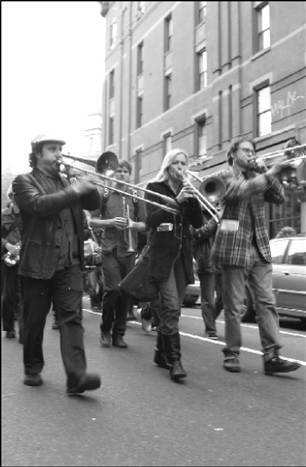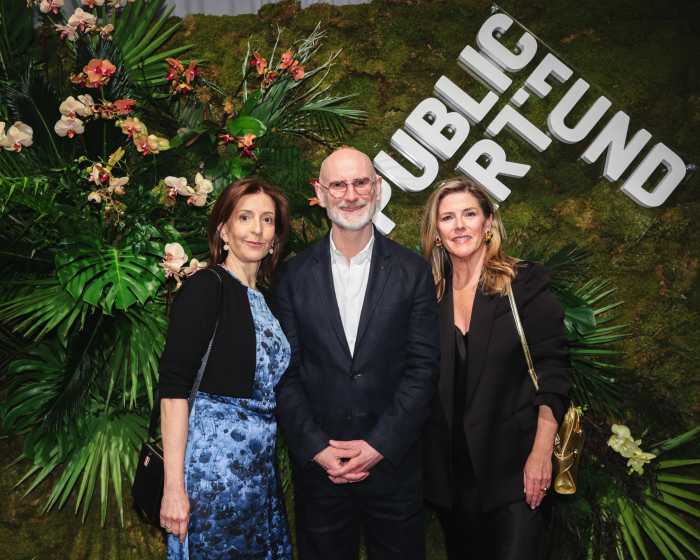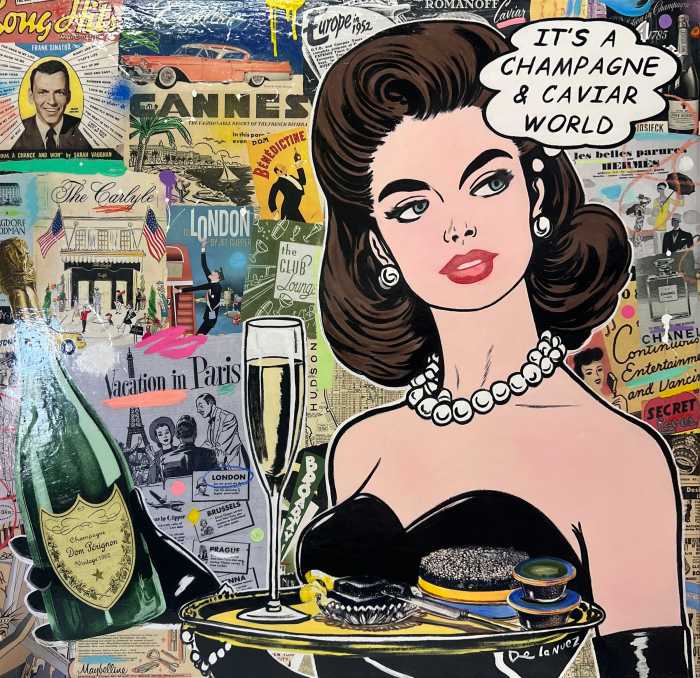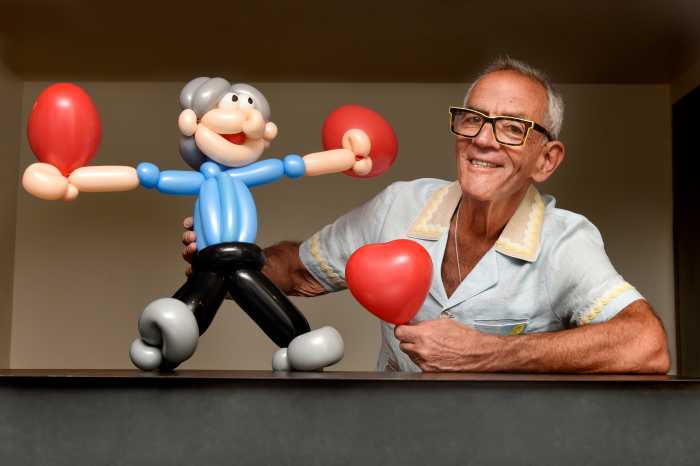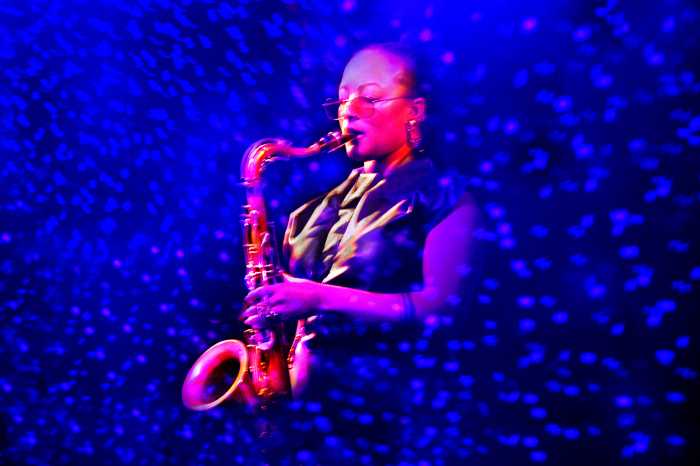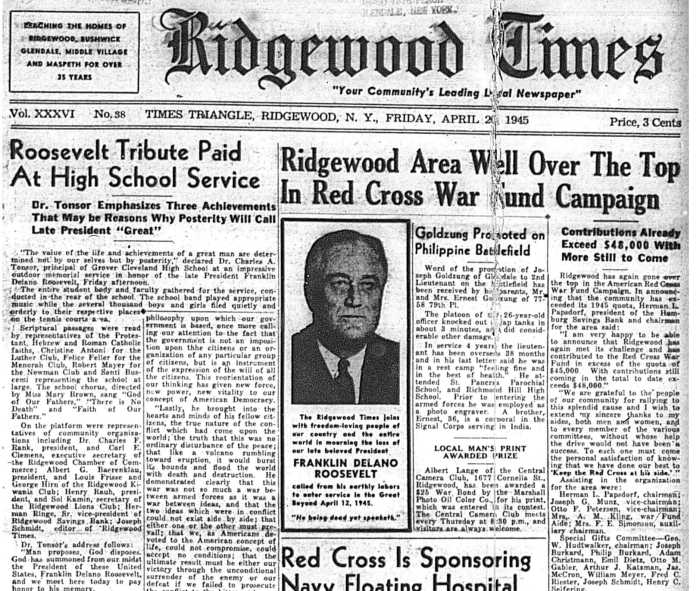By Brooke Edwards
Calling all trombone players: The Hungry March Band is looking for one talented musician to join its forces. Interested applicants must not be afraid of practicing long hours for little or no pay, of wearing eccentric costumes in front of large crowds and of marching between enthusiastic belly dancers and fire-spinners.
Needless to say, they’re not your typical marching band.
The Hungry March Band, out of Brooklyn, has been entertaining crowds with its original songs and bizarre performances for nearly a decade. They are hoping the fourth time’s a charm, as they prepare to produce album number four and set out on their fourth European tour.
At the core of the band are 25 members who play brass and percussion instruments, including trumpets, trombones, saxophones, sousaphones, tubas, snare drums, bass drums, cymbals and a washboard.
“Most marching bands do mostly covers, but we do a lot of originals,” said Theresa Westerdahl, known in the band as Tara Fire Ball. Westerdahl is the band’s tom-tom player and managing director. “We have several composers in the group,” she said.
H.M.B.’s musical influences include, according to their Web site, “Eastern European Gypsy brass, Bollywood film scores, New Orleans second line, Jamaican ska, Balkan beats, jazz, punk, Afro-Cuban, Middle Eastern, Latin flava and hip-hop.”
And the band members are as diverse as the sounds they produce.
“We have big people, small people, gay people, straight people…” Westerdahl’s voice trailed off.
The band’s youngest player is Sammy Fairey, the 10-year-old son of saxophonist Emily Fairey. Sammy plays the drums.
The band also has Canadian and Japanese members, and has recently incorporated two “refugee” musicians from New Orleans: J.R., who plays the trumpet, and Don, who plays the helicon. Both are in a group called Panorama, which is struggling to survive after Hurricane Katrina.
H.M.B. played in New Orleans one year before Katrina. Westerdahl was pregnant at the time, and wasn’t able to go.
“We haven’t been able to go back down there since,” she said, citing a lack of resources and housing. “Katrina took that away from me.”
But Westerdahl has been able to travel with H.M.B to Italy, Germany, Switzerland, the Netherlands and France. In fact, she says, “I have a 3-year-old and she was made on our first trip to Europe.”
As they prepare to return to Europe, Westerdahl said, “We’re a little bit of celebrities there,” crediting the overseas popularity of the film “Short Bus,” where H.M.B. made an appearance.
She says that the filmmakers “were looking for an authentic New York experience, and that’s us.” She sent them a demo tape and they contacted the band a few months later.
Since H.M.B doesn’t need an electric amplification system, they are able to play practically anywhere, carrying what they need on their backs. This has led to performances in a wide variety of venues.
H.M.B. has performed at film festivals, art gallery openings, subway cars, funerals, weddings, protests, rallies, festivals, clubs, circuses and parades, both human and canine, to name a few.
The band is usually booked solid, with as many as five shows in one weekend, though they took this past Sunday off in honor of the Academy Awards.
On Friday night H.M.B played at the Brooklyn Academy of Music Café between performances by a family vaudeville circus, whose talents included walking on glass and spinning a 9-pound top in the palms of their hands.
Wearing a blend of traditional band costumes and 1920s-style suits and skirts — with a trumpet player dressed as a Trojan soldier and a washboard player sporting a giant bird head with purple feathers thrown in the mix — the band marched through the crowd and crammed all of its members onto the small stage. H.M.B. then got the otherwise-mellow crowd dancing and cheering, making it clear why they are in such high demand.
They’re well known in the Lower East Side and East Village, where they recently were the orchestra for a performance piece, “Once There Was a Village,” based on the book by Yuri Kapralov, at La MaMa theater on E. Fourth St. They also recently played at the ceremony for the co-naming of E. Ninth St. and Avenue B after the late Armando Perez, who was the creative director of the former CHARAS/El Bohio.
“It’s getting to the point where people can’t make every gig,” Westerdahl said. She said they are looking for backup players for each instrument.
In addition to the 25 regular band members, when H.M.B. performs at bigger events, their numbers can swell to as many as 100. This includes a second line of musicians and an entourage known as the Pleasure Society.
“My husband and 3-year-old daughter are in the Pleasure Society,” said Westerdahl. “They come and dance when it’s appropriate for kids.”
The Pleasure Society is made up of dancers, gymnasts, baton twirlers, fire-spinners, hula hoopers, stilt walkers and puppeteers, adding to the band’s visual appeal and encouraging crowd involvement.
In spite of their popularity, H.M.B. is not very profitable for its members.
“We do so much community work that doesn’t really bring in any money,” Westerdahl said. “And when we do get money, most of it just goes back into the band to pay for touring and everything.” As a result, she said, “Everybody has other jobs.”
Ben, one of the trombone players, is an editor at Penguin books, while “Washboard Ben” is a geophysicist. Ruth, who plays the baritone sax, is a neurologist. Emily on tenor sax just got her Ph.D. in literature. There are also a few teachers, some painters and even a few professional musicians.
Westerdahl is a licensed massage therapist, though she hasn’t been working after having her baby and with the band taking up so much of her time.
And the practices are about to get even more intense, as the band begins rehearsing for production of its fourth album, set for release in May of this year. While H.M.B.’s first three albums have been self-produced, the band is still considering working with a producer for their latest release, though it may be difficult to find an outsider who can capture the spirit of H.M.B.
Westerdahl jotted down the following quote — which is now featured on the band’s Web site — after a performance: “Fear shall lead you to the place you most need to be. When you arrive, dive into the sea of the unknown. We will be there cheering you on, furiously playing in a state of absolute delightful madness.”
That pretty much sums up the experience of seeing the Hungry March Band perform. Though you may feel like you don’t quite get it, you’ll surely enjoy trying.



